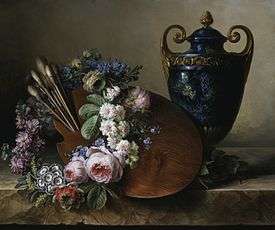Charlotte Eustace Sophie de Fuligny-Damas
Charlotte Eustace Sophie de Fuligny-Damas, the Marquise de Grollier (21 December 1741, Paris – 1828, Épinay-sur-Seine), was a French flower painter.
Charlotte Eustace Sophie de Fuligny-Damas | |
|---|---|
.jpg) Portrait of the Marquise by Élisabeth Vigée Le Brun | |
| Born | December 21, 1741 Paris, France |
| Died | 1828 (aged 86–87) Épinay-sur-Seine, France |
| Nationality | French |
| Known for | Painting |
| Spouse(s) | Pierre Louis de Grollier
( m. 1760–1793) |

Biography
Her father was Henry Anne de Fuligny-Damas (1669-1745), Comte de Rochechouart, Baron de Couches, Marigny-sur-Ouche, Aubigny, Agey and Saint-Péreuse. She lost him at age three. When she turned seven, she was given into the care of the canonesses at Remiremont Abbey, where she received a classical education.[1] After displaying a talent for drawing, she received lessons in Paris from Jean-Baptiste Greuze and Gérard van Spaendonck.
In 1760, she married Pierre Louis de Grollier, Marquis de Grollier and Treffort (1730-1793), the Governor of Pont-d'Ain and Deputy of the Nobility. While living at his castle, she became popular with the poor inhabitants of the nearby village. Later, they lived at the court in Versailles, in the apartments of Marie-Antoinette. She was attracted to the gardens there and later created one of her own in Lainville-en-Vexin.
In 1793, she lost her husband to the guillotine and was forced to leave France. She went to Switzerland, then Germany and, finally, Italy. In Florence, her talent was soon recognized. The sculptor, Antonio Canova, once referred to her as the "Raphael of flowers". At this time, she also created some mosaics.
Joseph-Marie Vien, Director of the French Academy in Rome, arranged for her return to France. She settled in with her nephew, Alexandre-Charles-Emmanuel de Crussol, at his château in Épinay-sur-Seine, where she practiced horticulture as well as painting. After his death, she began to give large sums to charity in his name.
In 1823, she prevailed upon the engineer, Louis-Georges Mulot, to create an artesian aquifer in the château's park to provide clean drinking water for the local villagers. The work lasted for three years. In recognition for her efforts, she was named one of the founding members of the "Société d'Horticulture". She died shortly after, aged 86.
References
- François-Alexandre de La Chenaye-Aubert, Dictionnaire de la Noblesse, chez la Veuve Duchesne, 1776.
External links
![]()
- Sophie de Fuligny-Damas @ Geneanet